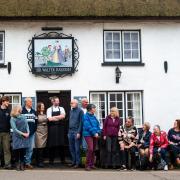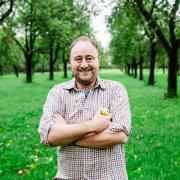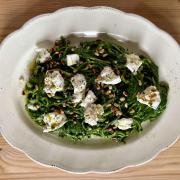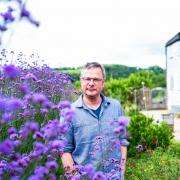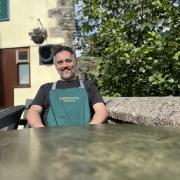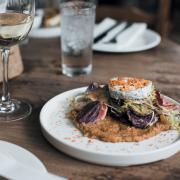I’m standing in a field, high on a hill not far from the coast in North Devon. Surrounding this spot, spreading into the distance is a familiar agricultural landscape, an undulating carpet of expansive areas of uniform green.
The contrast is extraordinary; I’m among hundreds of plants, shrubs and trees. In this group of smaller fields, there are fat hedgebanks billowing with growth, in one area long grasses flow around shrubs and two metre-high young trees and in the centre of the site is a meadow of delicate flowers and grasses. Lines of raised beds are packed with edibles growing closely alongside each other - broad beans, fennel, cabbages, lettuces... but there’s also plantain, fat hen, chickweed, and stinging nettles.
‘I have stinging nettles in every bed,’ says the head gardener at Birch Farm, Josh Sparkes.

A team of three full-time and one part-time gardener tends this multi-faceted, market garden site, which along with the nearby Animal Farm, which produces low density, pasture fed and heritage breed beef, pigs, sheep and chickens, makes up the 150 acre Birch Farm at Woolsery.
The farm provides produce for The Farmers Arms, the village pub which lies at the heart of The Woolsery Collective.

My second visit is on a warm July morning and the site is full of growth.
From the beginning, the aim was to create a sustainable system for growing food, testing out all the latest thinking about farming naturally, growing with minimal cost and intervention and in a way which is sustainable, climate change resilient and which supports the soil and encourages wildlife.
The way forward, Josh believes, is in perennial plants, in part because they are far better suited to coping with increasing climate disturbances.

READ MORE: The history of The Woolsery Collective in north Devon
This is not a token nod to foraging, the Woolsery chefs are totally absorbed in the farm and are dedicated to finding new ways of using perennial and often wild produce, showing us what we can eat and innovative ways of how to cook it.

Tree leaves, harvested from the site’s edible forest garden, are a core feature in The Farmers Arms’ salads. They provide a variety of flavours and textures, but are also highly nutritious and work out far cheaper to grow than lettuces, Josh tells me. A salad may contain salad burnet, chicory, nettles, kales and lime tree and grapevine leaves. And so far this year they have produced kilos and kilos of these foods.
The chefs and gardeners are also working together to create flours from grains of perennial plants like buckwheat, and even dock.

No chemicals or fertilisers are used anywhere on the site, and they use a ‘chop and drop’ system, vegetation is cut back and trampled on the ground, so putting nutrients back in, without disturbing the soil.
Getting root systems from perennials in the ground is crucial, says Josh. He’s delighted that, so far, every bed has at least one perennial in it.

These plants look notably healthy and now the farm is getting more established, the team is finding much less damage by pests. The fruit bushes no longer need netting from birds, and rabbit and slug damage is mostly confined to the very ends of beds. There’s simply so much choice within the eco system they’ve created at Birch Farm, in the various ‘wild’ areas and those deep hedges.
Josh is a whirlwind of energy, enthusiasm and accumulated knowledge and as we tour the site and I absorb all this information, he picks berries, peas and baby beetroot for me to try. I’m also presented with a succession of new taste sensations, leaves and stems that offer juiciness, spicy heat and sweetness, lemony flavours, bitter and earthy notes - and some I just can’t begin to describe. Birch Farm is proving to be a new and exciting adventure for all of us.










